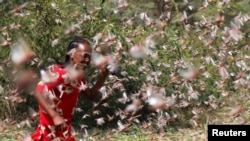The U.N. Food and Agriculture Organization has warned that an outbreak of locusts in the Horn of Africa may soon spread to other countries.
In a joint press conference Friday, the FAO and the East African regional body IGAD said locusts feeding on crops could leave millions of people without food.
Bukar Tijani is the deputy head of Africa for the FAO. He gave an update on the locust migration in the region.
"The invested area – definitely Kenya, Ethiopia, Somalia but also Eritrea," Tijani said. "Then countries at risk in eastern Africa – South Sudan and also Uganda. Sudan and Egypt are also infested, so we are looking at a whole region of the locust because of these conditions, which is very suitable for locust breeding.”
Unusual weather patterns, including heavy rains since October, and general climate conditions are blamed for the spread of the desert locust swarms.
Thiofilas Mwenda describes how the pests ruined his farm in eastern Kenya.
“At around five in the evening, yesterday locust invaded on my farm, ate my maize," Mwenda said. "In the morning, they started eating maize and other food crops on the farm. Then they started eating animal feeds. It ate everything in my farm. I don’t know what to do.”
The United Nations food and agricultural agency warns the food situation will worsen if nothing is done to stop the swarms from spreading.
Tijani says people who lost their crops and food supply will need financial support.
“For food insecurity, FAO is working very closely with World Food Program, and they know exactly what we are doing, how we are doing, and we are making assessment so that we can look at families who have been affected, that have lost livelihoods to support them before the next rainy harvest season," Tijani said.
Authorities say they are dealing with locust numbers in the billions.
Stephen Njoka of Desert Locust Control Organizations says they are deploying aircraft to control the swarms.
“The respective governments have acquired pesticides," Njoka said. "I want to assure the people of Kenya and Ethiopia where we are spraying now the pesticides we are using are safe for non-targets, and they should not fear poisoning. We do, of course, tell people where we have sprayed you take sometime before you go in there, and the people who are on the ground should have protective clothing.”
The FAO says the locust invasions may continue until June.




